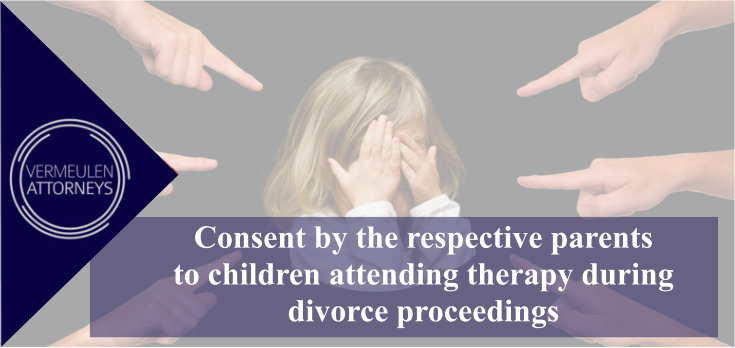
Major Decisions Involving Children: Consent By The Respective Parents To Children Attending Therapy During Divorce Proceedings
Major decisions involving children: Consent by the respective parents to children attending therapy during divorce proceedings
Many parents, during the divorce proceedings between them and their spouse, notice the effect such divorce has on their children and consequently would want their child to visit a Psychologist and / or Therapist to assist in their processing the emotions. Despite this, there are many cases where one parent (a non-consenting parent) refuses consent for their child(ren) to see a Therapist during divorce proceedings. What right does the other parent (the consenting parent) then have? Can a parent refuse consent in this regard? This article seeks to explain the position regarding major decisions involving children, more specifically in respect of children attending therapy during divorce proceedings.
What must a consenting parent of a child consider before just sending their child for therapy during the divorce proceedings?
Section 31 of the Children’s Act 38 of 2005 states that:
“Before a person holding Parental Responsibilities and Rights in respect of a child takes any decision involving a child, that person must consider the views and wishes expressed by the child, bearing in mind the child’s age, maturity and stage of development.
A decision, as mentioned above, is any decision:
- In connection with a matter listed in Section 18(3)(c);
- Affecting contact between the child and a co-holder of Parental responsibilities and Rights;
- Regarding the assignment of guardianship or care in respect of the child to another person in terms of Section 27; or
- Which is likely to significantly change, or to have an adverse effect on, the child’s living conditions, education, health, personal relations with a parent or family member or, generally, the child’s well-being.”
Must a consenting parent who wants to send their child for therapy during the divorce proceedings, consider the views and wishes of the non-consenting parent?
Yes, before the consenting parent wants to send their child for therapy during the divorce proceedings, they must consider the views and wishes expressed by the co-parent.
What if one parent does not want to consent to the child attending therapy during divorce proceedings – What can the consenting parent do?
The consenting parent can still send the child for therapy and a Therapist with the necessary competence may accept the parent’s mandate to assess the child. This is provided that:
- The consenting parent has reasonably applied his / her mind to the child’s and the non-consenting parent’s wishes;
- The consenting parent is strongly of the view that the sessions with the Therapist will assist in determining the best interests of the child; and
- The Therapist does not, upon consulting with the child, make final conclusions and / or recommendations. The Therapist not reaching final conclusions and / or recommendations if only one party has consented to the therapy, is purely to act in the interest of fairness.
Where any allegation concerning a child comes out during the therapy session against a parent, under circumstances where only one parent has consented to the therapy, the Therapist should consider formulating an opinion which should be brought to the attention of the parent against whom the allegation is made, in order that the parent is afforded an opportunity to respond.
Therefore, should the above circumstances be applicable to your family, make use of the guideline provided in order to safeguard the interests of all parties involved. Should you require any assistance regarding children’s rights, feel free to contact our offices for more information.











